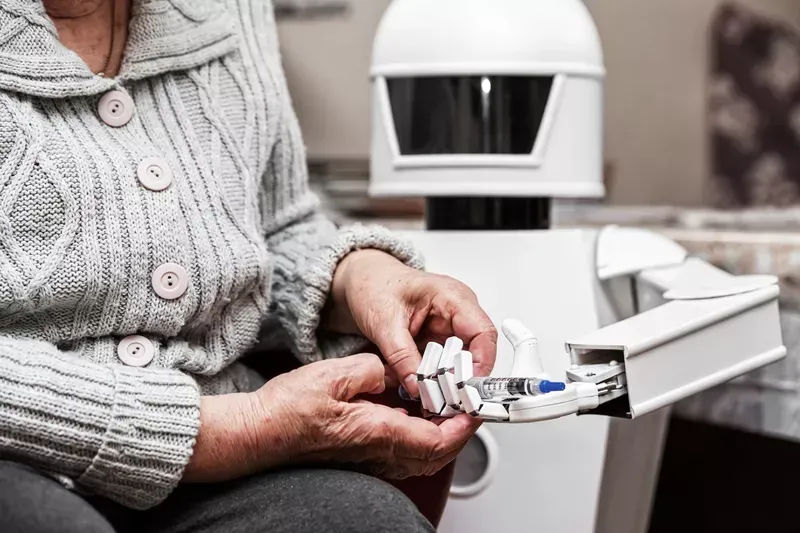BLOG
How Robotics and AI are Improving Senior Care
Integrating robotics and artificial intelligence (AI) into senior care is transforming the landscape of elder support services. These technologies enhance the quality of life for older adults by promoting independence, improving health monitoring, and providing companionship. As the global population ages, the demand for innovative solutions in elder care continues to grow. Understanding how robotics and AI contribute to senior care is essential for families and caregivers seeking effective and compassionate support options.
Assisted living facilities are increasingly adopting AI-driven tools to address the diverse needs of their residents. Such technologies benefit seniors and alleviate caregivers' worries for more focused and efficient care delivery.
Improving Daily Living Through Robotics
Robotic technology is crucial in assisting seniors with daily activities, thereby promoting autonomy and reducing reliance on human caregivers. Devices such as robotic walkers and exoskeletons enable individuals with mobility challenges to navigate their environments more safely and confidently.
In addition to mobility aids, robotic systems can be used for household tasks, such as cleaning and meal preparation. Autonomous vacuum cleaners and robotic kitchen assistants help maintain a clean and organized living space. These technologies allow older adults to manage their homes more effectively, fostering a sense of control and self-sufficiency. The convenience offered by these robotic solutions contributes to a more comfortable and manageable living environment.
Robotic companions are also emerging as valuable assets in senior care. They provide emotional support and reduce feelings of loneliness. These interactive robots engage in conversations, play games, and even remind users to take medications, offering companionship and practical assistance.
The presence of a responsive and engaging entity can have a positive impact on mental health and overall well-being. Such innovations are particularly beneficial for seniors who may have limited social interactions.
Advancing Senior Care and Health Monitoring with AI
Artificial intelligence is revolutionizing health monitoring in senior care by enabling proactive and personalized medical support. AI-powered systems can analyze data from wearable devices to track vital signs, detect anomalies, and predict potential health issues. Such capabilities are particularly valuable in managing chronic conditions common among older people.

In assisted living facilities, AI algorithms assess residents' healing and adjust care plans accordingly. These systems can identify subtle changes in behavior or physiology that may indicate emerging health concerns.
AI also facilitates medication management by sending reminders and monitoring adherence to prescribed regimens. Automated alerts help prevent missed doses and potential drug interactions, promoting better health outcomes. The reliability of AI systems in this context contributes to safer and more consistent medication practices.
The integration of AI into health monitoring empowers seniors to take an active role in managing their well-being. For caregivers, AI offers a valuable tool for delivering personalized and responsive care. The connection between AI and human support enhances the overall quality of senior care services.
Supporting Cognitive and Emotional Well-being in Senior Care
Cognitive decline and emotional challenges are prevalent concerns in senior care. AI-driven solutions are addressing these issues with innovative approaches. Interactive AI platforms offer cognitive stimulation through games, puzzles, and educational content tailored to individual abilities. Engaging in such activities helps maintain mental acuity and slows the progression of cognitive impairments. Regular mental exercise is key to preserving cognitive health among older people.
AI companions also provide emotional support by engaging in conversations and recognizing users' moods. Users ' systems can respond empathetically, offering comfort and companionship to seniors experiencing loneliness or depression. The consistent presence of an attentive entity can alleviate feelings of isolation and enhance emotional well-being. Such support is especially beneficial for individuals with limited social interactions.
In memory care settings, AI technologies create personalized reminiscence experiences. Personalized reminiscence therapy exemplifies AI’s potential to enhance emotional care.
Supporting Caregivers and Reducing Burnout
Caregiving in senior care communities often comes with significant physical, emotional, and mental strain. AI and robotics can alleviate some of this burden by automating tasks such as meal delivery, medication reminders, and mobility assistance. This technology helps caregivers focus on the more human aspects of their work, like offering emotional support and companionship.

AI-powered tools also assist with managing resident schedules, allowing caregivers to better organize their time and reduce stress. These systems help allocate resources more efficiently, ensuring that each resident receives the attention and care they need.
As a result, caregivers have more time to engage in meaningful interactions with residents rather than being bogged down by administrative tasks. Streamlining workflows allows for a healthier, more supportive work environment for staff, improving the overall care experience.
Robotic aids that assist with tasks such as bathing, lifting, and dressing help reduce the physical strain placed on caregivers. Caregivers also report feeling less emotionally drained, as they can focus on the aspects of care that require empathy and human connection. As a result, integrating AI and robotics promotes a more balanced and supportive work environment for senior care professionals.
Technology that eases caregiver burdens can help prevent burnout, ensuring that caregivers remain engaged and motivated. With the continued integration of AI and robotics, the future of caregiving can be more sustainable, with technology enhancing both care quality and caregiver well-being.
The Future of Senior Care: Embracing Technology for Better Outcomes
Integrating AI and robotics in senior care is only the beginning of a technological revolution that promises to improve the lives of residents and caregivers. As advancements continue, these tools will become even more sophisticated, offering personalized care plans and real-time health monitoring.
AI can analyze vast amounts of data to create individualized care strategies that cater to each resident’s needs, improving outcomes and quality of life. With the continued development of these technologies, senior care will become increasingly more efficient, effective, and compassionate.
Robotics and AI will also help senior care providers better meet the growing demand for services, address staffing shortages, and increase the accessibility of high-quality care. The aging population is rapidly increasing, and technology will play a critical role in ensuring that all seniors receive the care and attention they deserve.
Senior care communities that embrace these technologies will be better equipped to deliver personalized, compassionate care while maintaining a sustainable workforce. The balance between human empathy and technological innovation is crucial to ensuring seniors receive the highest standard of care. The future of senior care is undoubtedly intertwined with advancements in AI and robotics, making it an exciting time for both residents and caregivers.
New Technology For Better Elder Care
Embracing AI and robotics in senior care facilities is paving the way for better, more efficient care. The future looks bright, from improved safety and monitoring to enhanced social interaction and reduced caregiver strain. Assured Senior Living recognizes the importance of integrating these technologies to deliver residents the highest level of care.
Assured Senior Living is ready to offer the support and innovation your loved ones deserve. Contact us today to learn more about how our care programs are evolving with technology to improve lives.














